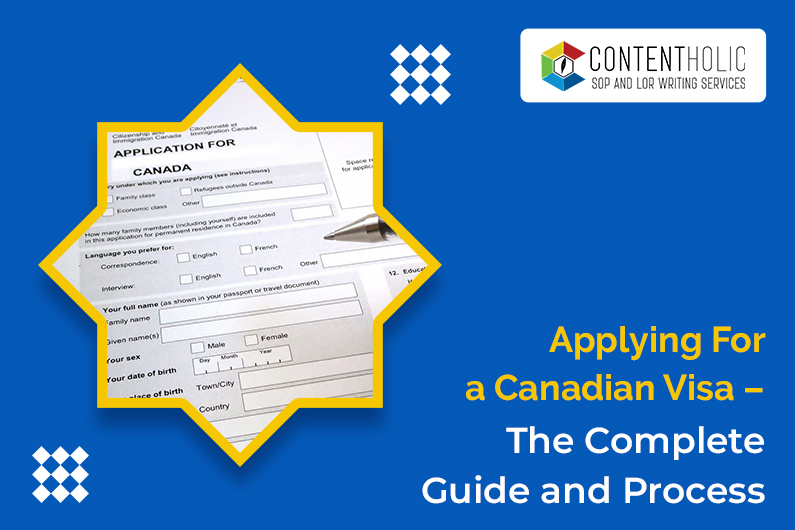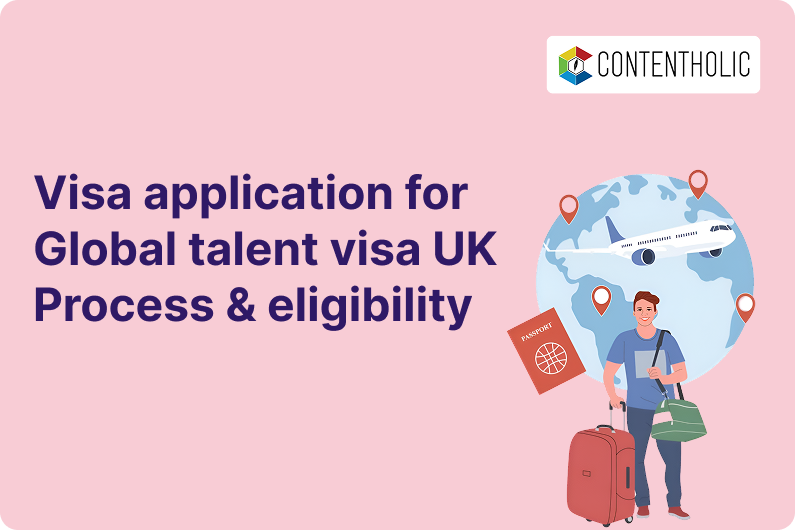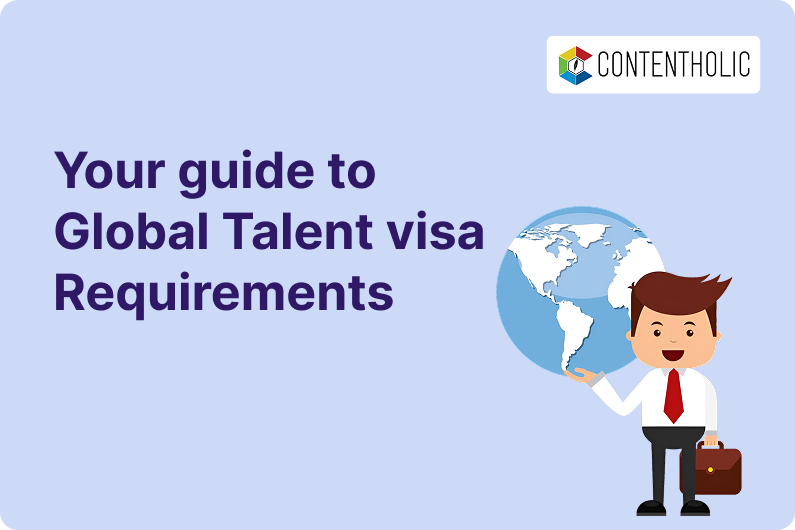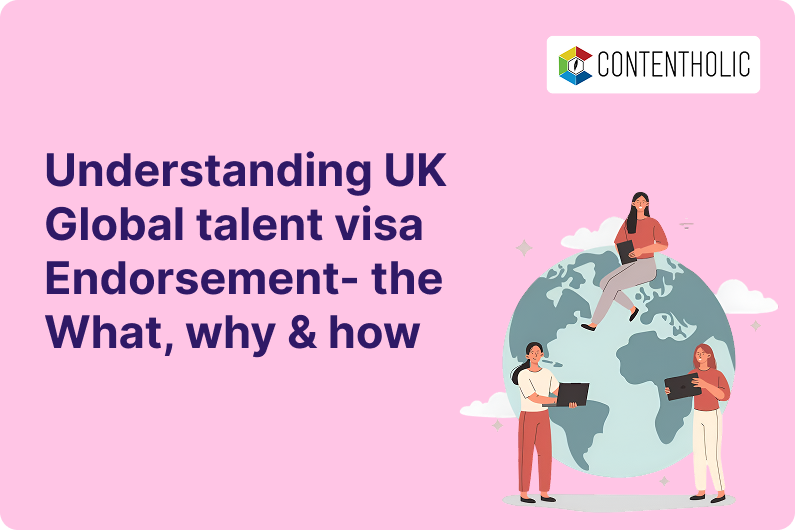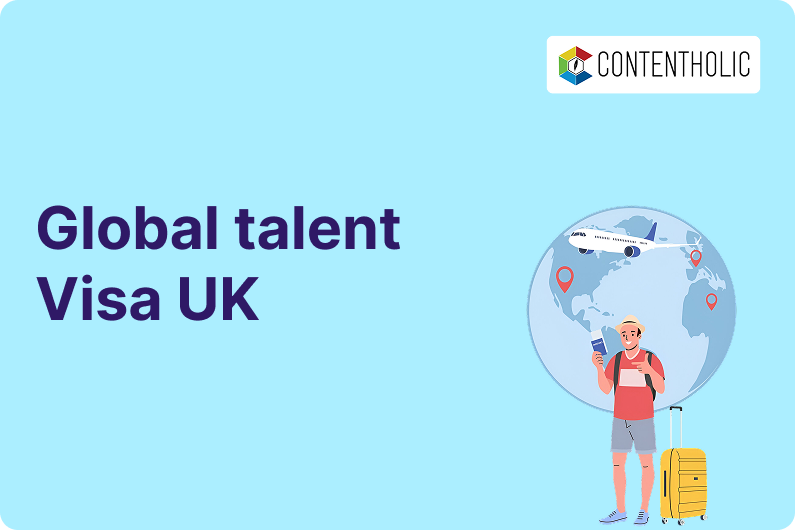Applying for a Canadian visa can open up a world of opportunities for people who wish to live, work, or study in Canada but applying for a Canadian visa can be a complex process, it’s important to ensure that you meet all the eligibility criteria and provide all the necessary documents to get your application approved. all the requirements, this article will provide an in-depth look at all the steps necessary to apply for the visa.
Why Canada?
Canada is a beautiful country with stunning natural scenery, diverse culture, and welcoming people. It is a popular destination for immigrants who want to settle permanently in the country. There are several pathways to permanent residency, including Express Entry, Provincial Nominee Programs, and Family Sponsorship. The country also offers many opportunities for entrepreneurs who want to start a business.
Canada has a thriving economy and offers many job opportunities in various industries. If you want to work in the country, you can even apply for a work permit.
Another key benefit of seeking immigration in Canada is the quality of education. Canadian universities and colleges are known for their academic excellence and are recognized worldwide. The country is home to many top-ranked institutions, such as the University of Toronto, McGill University, and the University of British Columbia.
Studying at one of these institutions can provide you with an education that is respected and valued by employers around the world. In addition, studying in Canada can be more affordable than studying in other countries such as the United States or the United Kingdom.
Tuition fees in the country are relatively more affordable, and there are many scholarships and bursaries available for international students.
Given these perks, it is of no surprise that Canada has one of the highest immigration rates per population of any country in the world, with approximately 300,000 new immigrants entering the country each year.
What is a Canadian Visa?
A Canada visa is a document issued by the Canadian government that allows foreign nationals to enter Canada for a temporary period, typically for the purpose of tourism, business, or study.
There are different types of visas available depending on the purpose of the visit, including visitor visas, work permits, study permits, and permanent resident visas.
To obtain a Canada visa, applicants must meet certain eligibility requirements and provide supporting documents such as a valid passport, proof of funds, and a letter of invitation, depending on the type of visa being applied for. The specific requirements and application process can vary depending on the type of visa and the country of the applicant’s origin. The decision of the Canadian Consulate or Embassy in your home country to grant you a visa to Canada indicates that you meet the entry requirements. However, in any case, in the event that they suspect that you are not qualified to enter the country when you arrive at the customs , you will be permitted entry by the Canadian Border Services Officer (BSO).
Who needs a Canadian Visa?
The Canadian visa system helps the government to regulate who enters the country and for what purpose. This is important for security and for ensuring that those who come to Canada are doing so legally. Foreign nationals who are not Canadian citizens or permanent residents typically need a visa or an Electronic Travel Authorization (eTA) to enter Canada. The type of visa required depends on the purpose of the visit and the length of stay.
Here are some examples of individuals who may need a Canadian visa:
- Tourists and visitors: Individuals who are coming to Canada for a short visit, such as to attend a conference, visit family or friends,.
- Students: Individuals who are seeking a better education by applying to a university of their choice.
- Workers: Individuals who are coming to the country for work opportunities that they may not have in their home country.
- Permanent residency applicants: Individuals seeking a good quality lifestyle.
Types of Canadian Visas
The Canadian visa is important for managing immigration and ensuring that Canada remains a welcoming and prosperous country.
It is essential to know which visa you want to apply for before you can apply for a Canadian visa. Down below are the different types of Canadian visas:
- Temporary Resident Visa: This visa allows foreign nationals to enter Canada for a temporary period, usually for work, study, or travel purposes.
- Student Visa: This visa allows foreign nationals to study at a designated Canadian educational institution.
- Work Visa: This visa allows foreign nationals to work in Canada on a temporary basis.
- Visitor Visa: This visa allows foreign nationals to enter Canada for tourism, visiting family or friends, or other personal reasons.
- Express Entry Visa: This is not a visa, but a system used to manage applications for permanent residence for skilled workers who want to immigrate to Canada.
- Family Sponsorship: This visa allows Canadian citizens or permanent residents to sponsor their family members to come and live in Canada.
Temporary Canada Visas:
The temporary Canada visa can be of two types either:
- For Single entry
- For Multiple entries.
The Canadian Consulate or Border Services Officers (BSO) determine the length of time a person can stay in Canada with a temporary Canada visa. Most of the time, this is up to six months.
A person with a single-entry visa can enter Canada once, stay in the country for six months, and then return to their home land while a person with multiple entries can enter Canada several times with a multiple entry visa before their visa runs out and allow them to stay for a short time.
It is important to pick the one that fits the purpose of your visit before you go to Canada.
Some other types of Temporary Canadian Visas are:
- Canada Super Visa: Some Canadian Permanent Residents may have family members living in other countries, this Visa allows their close blood ties like parents or grandparents to visit their children or grandchildren for an extended period stay.
- Canada Tourist Visa: The holder of a Tourist Visa is permitted to enter Canada for strictly the purpose of tourism.
- Canada Business Visa: The holder of this Visa is permitted to enter Canada if they are venturing out to the with business purposes as either an individual or in a group of people.
- Diplomatic and Official Visa: This Visa is designed for Officials and diplomats from other countries and it allows them to enter the country for official purposes and duties.
- Courtesy Visa: All individuals who are regarded as important because of their ranks and positions but do not qualify for a Diplomatic and Official Visa are granted the Courtesy visa. This includes diplomats who intend to travel for tourism or members of trade missions.
- Visa to give birth: People who meet all of the requirements for a temporary Canada visa and are pregnant and wish to give birth in the country, are granted it. When a woman gives birth in Canada, the child automatically becomes a Canadian citizen.
- Canada Facilitation Visa: Canadian citizens who hold dual nationalities and do not hold a Canadian passport but do hold a passport of another nationality are eligible for facilitation visas. The person’s other nationality visa is stamped with the facilitation visa because getting a Canadian passport is extremely difficult.
- Intending Organ Donors Visa: A person whose purpose of visit is to donate an organ to a Canadian citizen or Permanent Resident is granted this visa.
- Canada Student Visa: Those who have been accepted to a Canadian university in order to finish their studies are granted a Canadian student visa. In the event that you are going to Canada to study for under 6 months, then you can get a TRV visa, but for over 6 months of studies, you are required to have a Student Visa.
- Canada Temporary Work Visa: People who have been offered a job in Canada and plan to work there for up to six months are eligible for temporary work visas. The individual must qualify for a temporary visa and present a valid letter of job offer from an employer in order to obtain this visa.
- Permit for Temporary Residence: People who need to travel to Canada for other reasons but are otherwise ineligible for a Temporary Resident Visa (TRV) are eligible for this permit. This permit is only valid for the required amount of time spent in Canada, such as two weeks for a workshop.
- Working Holiday Visa: For young people from 30 nations, the Canada Working Holiday Visa allows them to travel and work in Canada. Because it is a visa for random selection, applicants will submit their applications and wait to be selected at random to apply for the work permit.
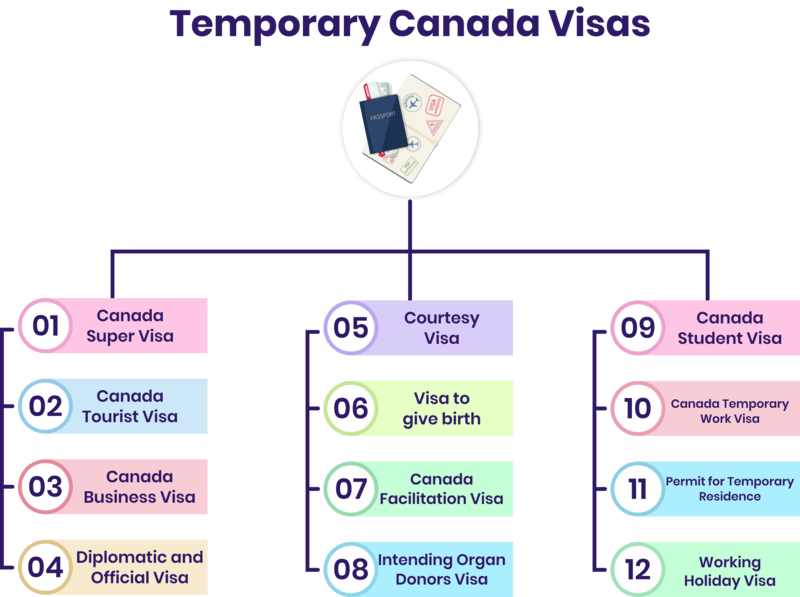
Permanent Canada Visas:
This program allows individuals to live and work in Canada on a permanent basis, and offer a path to Canadian citizenship. Once a person obtains a permanent residency visa, they can live and work in the country indefinitely, as long as they meet certain residency requirements. Permanent residents also have access to most of the same rights and benefits as Canadian citizens, including healthcare, education, and social services. These visas are also called Immigrant visas and have different types:
- Immigrant Investor Program: Individuals with a net worth of at least CAD$800,000 who intend to invest in the Canadian economy are eligible for the Immigrant Investor Program. They will receive a five-year interest-free return on their investment if they invest at least CAD$400,000.
- Startup Visa Program: Immigrants who intend to contribute to the economy individually are eligible for the Canada Startup Visa. They are required to have a net worth of at least CAD$300,000, make a commitment to owning and managing at least one third of a Canadian company, and establish and maintain employment within three years of their arrival.
- Self-employed Persons Visa: People who are capable of starting their own businesses and possess skills in business, athletics, culture, or farming are eligible for the Self-employed Persons visa. They must demonstrate not only their expertise in those specific areas but also how they will finance the business.
- Family-Sponsorship Program: The Family Sponsorship Program is a popular immigration program in Canada, and the Canadian government processes a large number of applications every year. It allows Canadian citizens and permanent residents to sponsor their eligible family members to come and live in Canada permanently. The program is designed to reunite families and help them live together in Canada.
- Live-in Caregiver Program (LCP): This immigration program allows qualified caregivers to work and live in Canada. The program is designed to help Canadian families find caregivers to take care of their children, elderly, or people with disabilities. Under the LCP, caregivers can apply for permanent residence after working for two years as a live-in caregiver in Canada. They are required to live with their employer and provide care for at least 30 hours per week
- Quebec-Selected Skilled Worker Program (QSWP): You can apply for the Quebec Skilled Worker Program to move to the province of Quebec and work there permanently if you are fluent in French and hold skills relevant to the jobs that are required there.
Express Entry Visas:
Express Entry is a system used by the Canadian government to manage applications for permanent residence from skilled workers who want to live and work in Canada. Express Entry is designed to streamline the immigration process and to make it easier and faster for highly skilled workers to come to Canada.
There are several programs that fall under the Express Entry system, including:
- Federal Skilled Worker Program (FSWP)
- Federal Skilled Trades Program (FSTP)
- Canadian Experience Class
- Provincial Nomination Programs (PNP)
- Federal Skilled Worker Program (FSWP)
The Federal Skilled Worker Program (FSWP) is one of the economic immigration programs managed by Immigration, Refugees and Citizenship Canada (IRCC) that allows skilled foreign workers to immigrate to Canada as permanent residents.
The FSWP is designed to select candidates with the skills and experience needed to succeed in Canada’s labor market and contribute to the country’s economy.
At the time you plan to apply, make sure to find out what kinds of jobs are needed in Canada to increase your chances for getting approved.
- Federal Skilled Trades Program (FSTP)
This program makes it possible for skilled tradespeople who want to immigrate to Canada to obtain permanent residency. By attracting qualified individuals with experience in specific occupations, this program is intended to assist in addressing the shortage of skilled tradespeople in Canada.
This visa is granted to qualified tradespeople working in fields like:
- Electricians
- Mechanics
- Carpenters
- Iron workers
- Welders
- Plumbers
- Machinists
- Crane operators
- Canadian Experience Class
Those who wish to change their status from temporary worker or student visa to permanent resident are eligible for the Canadian Experience Class permanent visa. They either have Canadian education, work insight or have sunk into Canadian culture.
- Provincial Nomination Program (PNP)
It is an immigration program in Canada that lets governments of specific provinces and territories nominate individuals with the skills and experience needed to help the economy of that given province or territory for permanent residency in Canada.
Each of these provinces and territories have its own PNP, which determines its own eligibility requirements and selection procedure based on the requirements of its particular labor market. The goal of the program is to find and keep skilled workers, business owners, and entrepreneurs who will help the economy grow.
Additionally, because it is quicker and more direct than other immigration programs, the PNP is a popular route to Canadian permanent residency. It also enables individuals to settle in a province or territory that is compatible with their career objectives and preferred lifestyle.
Canada Visa Application
Although applying for a Canadian visa depends highly on the type of visa you need to apply for, these are some of the general steps you can follow to:
- Try to find out if you qualify for a Canadian visa.
- Create an online account.
- Gather all your documents and compile them in a file.
- Pay the fees.
- Be patient and wait for processing of your Canadian visa.
- Submit your passport and processing fees.
- Try to find out if you qualify for a Canadian visa
The Canadian government has made it simple to obtain a Canadian visa. They have developed a variety of tests in which applicants are required to complete an online questionnaire in order to assess their eligibility. You will be asked a series of questions based on the kind of visa you want, and the system will tell you if you can apply or not. It will also send you the necessary instructions and steps to follow in order to meet all requirements.
How to access and navigate the government website?
To access the Canada visa eligibility questionnaires on the government website, you need to navigate through the Immigration tab. Once you click on the Immigration tab, a drop-down list of options will appear, including Visit, Immigrate, Work, Study, and others. Choose the option that corresponds to the visa you want to apply for. For example, if you want to apply for a tourist visa, you should select the Visit tab.
After selecting the appropriate tab, you will see more information, and one of the links will say “Find out if you can apply” or “Find out if you are eligible.” Click on this link to access the questionnaire. The questionnaire will ask you several questions ranging from personal information to travel history and reasons for visiting Canada. Once you have completed the questionnaire, the system will display your eligibility results.
Results
Upon completion of the questionnaire, you will receive one of three types of results:
- The first result indicates that you are eligible for the visa you have selected.
- The second result indicates that you are eligible for a different type of visa that the system will match you with.
- The third result indicates that you are not eligible for the visa.
The system will ask you to provide your contact information, typically your email address, and will then send you a set of documents if it determines that you are eligible for the visa you have chosen or another type. A reference code, detailed application instructions, and a description of the visa will be included in these documents.
The reference code is crucial information that you should not lose, as you will require it to start your application. The information you provided in the questionnaire will be conveyed through this code, which will also specify the kind of visa you are applying for. You can decide to store the reference code in different ways, like sending it to yourself, composing it on your PC, or on a piece of paper. However, it is essential that you do not lose it because doing so will require you to redo the entire questionnaire process. As a result, it is suggested that you save both the email and the documents that accompany it.
- Create an online account
The email instructions you receive will indicate whether you need to apply for a Canadian visa in person or through the online application process, which is becoming more prevalent as the Canadian government moves towards digitalization.
To apply online, you must first create an online account.
There are two options for creating an account:
- Using your online banking login, which is possible because the Canadian government has partnered with numerous banks.
- Creating a Government of Canada login (GCKey), you can choose whichever method is more convenient for you, but in either case, you will need to use your banking information to pay the visa fees.
- Gather all your documents and compile them in a file
After logging into your account, you may initiate your Canada visa application process using your reference code. Upon entering the code, the system will display a set of documents required for your application. You will need to provide supporting documents to prove that you meet the eligibility requirements for the visa. This may include things like a passport, proof of financial support, and a letter of invitation. Ensure you submit all the necessary forms online through the system before proceeding with your application.
- Pay the fees
There is a fee for most Canadian visa applications. You will need to pay the fee before your application can even be processed.
After confirming that you have submitted all the essential documents, the system will direct you to the payment page. You must pay the relevant Canada visa fees in accordance to the type of visa you are seeking. Once the payment is made, your application will be submitted.
After submission, it may take approximately five business days for the application to appear in your account.
By any chance, if you are applying in person, it will be best to take the necessary documents to the Canadian Embassy in your home country.
- Be patient and wait for processing of your Canadian Visa:
Depending on the type of visa, the Canadian Embassy will process your Canada visa application for a period of two or more weeks. Once a decision has been made, you will be notified of the outcome.Additionally, they may even request some more documents or require you to provide your biometrics and attend an interview.
If you are asked to provide biometrics and attend an interview, even if you applied online, it is important you visit the Embassy in person. You may need to schedule an appointment yourself, or the Embassy may arrange one for you. During the appointment, you will be required to provide your fingerprints and photographs and answer questions from a Canadian Embassy official.
The official will then evaluate your eligibility for a Canadian visa and inform you of their decision either immediately after your appointment or later via notification. All Embassy updates regarding your visa will be posted on your account, so it is important to check it regularly, even if you do not have to provide biometrics or attend an interview.
- Submit your passport and processing fee
The very step, if you are notified that your Canadian visa application has been approved, is to send your passport along with the applicable processing fees to the Canadian Embassy in your country.
The processing fees vary based on the type of visa you have applied for, and typically range from $20 to $50. You can pay the fees by check or money order. You will also need to pay for a return envelope of your passport.
Once the Embassy officials receive your passport and fees, they will affix the visa to your passport, and send it back to you. If you are notified of the visa decision immediately after your interview, you will need to pay the processing fees at that time and retrieve your passport right away.
After Having Your Canadian Visa Application Approved
After obtaining your Canadian visa, you will be able to travel to Canada. Upon arrival, you will need to present your passport and relevant documents to the officials at the point of entry. They will check your documents and may ask you a few questions about your purpose for visiting Canada.
The border officials hold the power to refuse entry into Canada, based on your answers they will determine whether to grant you entry into the country or not. If they suspect that you may engage in criminal activity or violate the terms of your visa, you can be denied entry to the country.
It is important to note that possessing a Canadian visa does not automatically guarantee entry into the country, as this decision ultimately rests with the officials at the point of entry.
Some frequently asked questions (FAQs)
Can I extend my stay in Canada?
Suppose your visitor visa in Canada is nearing its expiration, and you wish to continue your stay, you can request a visa extension, which is also referred to as a Canada Visitor Record. By simply applying for Canada visa extension (Visitor Record) at least 30 days before your visitor visa expires, you may get approved and extend your stay.
International students are also eligible to change their study permits to a visitor record only if they are present in the country.
What to do in case my Canada visa application gets declined?
In case your Canada visa application gets declined, you can submit a fresh application at any time, as long as your rejection letter does not prohibit you from doing so.
Also keep in mind, you can only re-apply if there have been changes in your circumstances or if you have additional information that could potentially enhance your chances of obtaining a Canada visa approval.
On the other hand, as far as appeals are concerned they are solely available for refugee and permanent residency applications, there is no procedure for appealing a Canada tourist visa decision.

